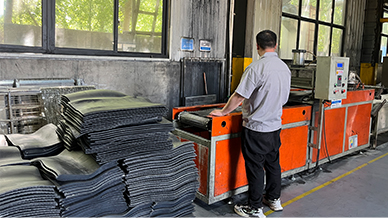heater hose for fuel line
Nov . 12, 2024 08:07 Back to list
heater hose for fuel line
Understanding Heater Hose for Fuel Line Applications
When it comes to automotive maintenance and repair, understanding the various components that contribute to a vehicle's functionality is crucial. Among these components, heater hoses and fuel lines play a significant role in ensuring the effective operation of the engine cooling and fueling systems. This article delves into the importance of heater hoses specifically for fuel line applications, their features, benefits, and considerations for use.
The Basics of Heater Hoses
Heater hoses are flexible tubes that carry hot coolant from the engine to the car's heating system and then back to the engine. They are typically made from high-quality materials designed to withstand heat and pressure. While these hoses primarily circulate coolant, their placement and functionality are essential in cooling down the engine, thus preventing overheating.
Heater Hoses in the Context of Fuel Lines
While heater hoses are not standard fuel lines, they can sometimes be used as fuel lines in specific applications or modifications. Understanding the differences and potential overlaps between these components is key to ensuring optimal performance and safety in automotive systems.
1. Material Composition Heater hoses are generally constructed from rubber or silicone compounds, designed to resist degradation from heat and coolant. When repurposing these hoses for fuel line applications, it is crucial to select a hose that is compatible with the type of fuel being used. Most conventional heater hoses might not withstand the corrosive effects of certain fuels like ethanol or biodiesel without degrading over time.
2. Pressure Ratings Heater hoses are built to handle specific pressures associated with the cooling system. Fuel lines, on the other hand, typically operate under higher pressure. Therefore, when considering a heater hose for use in a fuel line situation, it's important to check the pressure ratings of the hose to ensure it can safely handle the fuel system’s operational pressures.
3. Temperature Resistance Fuel lines can also be exposed to high temperatures, especially near engine components. A heater hose must be able to function effectively across the temperature ranges experienced in fuel systems. This is where silicone hoses demonstrate superiority, as they can withstand higher temperatures than standard rubber hoses.
Advantages of Using Heater Hose in Fuel Line Applications
heater hose for fuel line

2. Cost-Effectiveness In cases where traditional fuel line materials are not readily available, heater hoses can serve as a temporary or budget-friendly alternative. However, due caution and comprehensive testing should be performed to ensure compatibility.
3. Ease of Maintenance A well-constructed heater hose is relatively easy to replace in the event of wear, making it an appealing option for DIY enthusiasts looking to minimize costs on repairs.
Considerations for Use
While the flexibility and cost-effectiveness of using heater hose in fuel line applications exist, several critical considerations must be made
1. Compatibility Always ensure that the hose material is compatible with the type of fuel being used. Running incompatible hoses can lead to significant safety hazards, including leaks and potential fire risks.
2. Regulatory Guidelines Depending on the vehicle and location, certain regulations may govern the types of hoses that can be used in fuel line applications. Understanding and adhering to these guidelines is paramount for safety and compliance.
3. Duration of Use If a heater hose is utilized as a substitute fuel line, it should only be viewed as a temporary measure. Monitoring for signs of wear, degradation, or leaks is essential to prevent hazardous situations.
4. Performance Testing Any modifications involving the use of heater hoses as fuel lines should undergo thorough performance testing to confirm that they can handle the conditions of the vehicle's operation.
Conclusion
In conclusion, while heater hoses can sometimes be an alternative choice for fuel lines in automotive applications, they come with specific advantages and considerable cautions. It is critical for vehicle owners and mechanics to understand the requirements of both systems to ensure safety and performance. Knowledge of material compatibility, pressure ratings, and local regulations will contribute to better decision-making when considering heater hoses for fuel line use. Always prioritize safety and quality over convenience to ensure a reliable and long-lasting automotive system.
